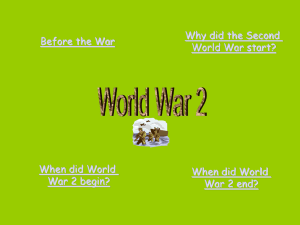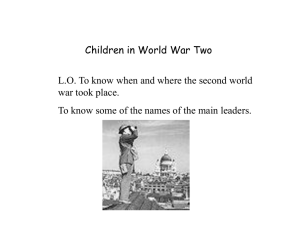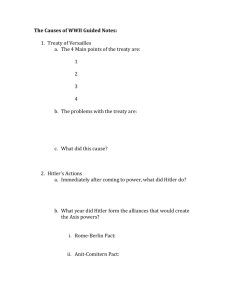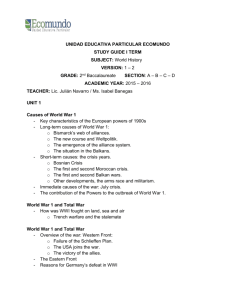WWII Webquest
advertisement
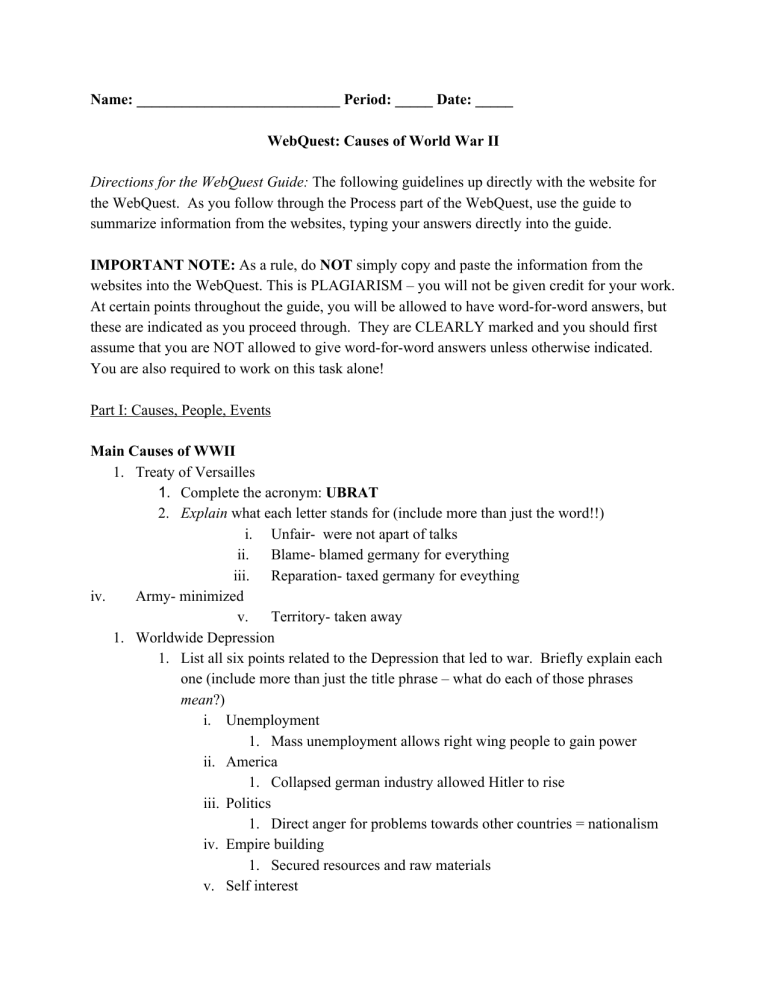
Name: ___________________________ Period: _____ Date: _____ WebQuest: Causes of World War II Directions for the WebQuest Guide: The following guidelines up directly with the website for the WebQuest. As you follow through the Process part of the WebQuest, use the guide to summarize information from the websites, typing your answers directly into the guide. IMPORTANT NOTE: As a rule, do NOT simply copy and paste the information from the websites into the WebQuest. This is PLAGIARISM – you will not be given credit for your work. At certain points throughout the guide, you will be allowed to have word-for-word answers, but these are indicated as you proceed through. They are CLEARLY marked and you should first assume that you are NOT allowed to give word-for-word answers unless otherwise indicated. You are also required to work on this task alone! Part I: Causes, People, Events Main Causes of WWII 1. Treaty of Versailles 1. Complete the acronym: UBRAT 2. Explain what each letter stands for (include more than just the word!!) i. Unfair- were not apart of talks ii. Blame- blamed germany for everything iii. Reparation- taxed germany for eveything iv. Army- minimized v. Territory- taken away 1. Worldwide Depression 1. List all six points related to the Depression that led to war. Briefly explain each one (include more than just the title phrase – what do each of those phrases mean?) i. Unemployment 1. Mass unemployment allows right wing people to gain power ii. America 1. Collapsed german industry allowed Hitler to rise iii. Politics 1. Direct anger for problems towards other countries = nationalism iv. Empire building 1. Secured resources and raw materials v. Self interest 1. Destroyed league of nations vi. Britain and France 1. Caused failure of league of nations 2. Totalitarian government 1. Germany i. What were Hitler’s three main aims? 1. Abolish treaty of versailles 2. Expand german territory 3. Defeat communism Abolish treaty of versailles ii. How did each aim lead to war? BE SPECIFIC. 1. Built up army above limit 2. he destroyed the League of Nations Disarmament Conference by demanding equality of arms with France and Britain 3. Moved his troops into a demilitarized zone 1. Japan i. Why did Japan invade Manchuria? Name 4 reasons. 1. To build an empire 2. Overcome economic depression 3. Gain resources 4. Control part of china ii. How did the League respond? Why were they limited in how they could respond? 1. Sent officials to study the problem and asked them to leave. 2. Many countries had ties to japan 1. Italy i. Why did Italy want the territory of Abyssinia? Name 2 reasons. 1. Resources 2. So Mussolini could show his new army ii. Why couldn’t the Abyssinians fight back? 1. Had pre ww1 weapons iii. Was the League’s response to the incident successful? Why or why not? 1. The response was not successful because italy controlled the region still iv. What three things did the League of Nations involvement in the conflict show? 1. Weak powers 2. America was not involved 3. World depression caused nations to be less helpful 4. No organizational skills 1. Soviet Union i. Why did Anglo-Soviet talks fail? List each piece of SCAB and briefly explain (again, more than just the one word!) 1. Chamberlain did not trust Stalin 2. Britain could not send troops to fight in Poland 3. Stalin believed that Britain would fall through for Poland. ii. Why did the Nazi-Soviet Pact happen? List each piece of THUG and briefly explain. 1. Time to prepare for war a. Stalin used peacetime with germany to prepare for war 2. Hope to gain a. Russia felt they could only gain from germany Britain and france fighting each other 3. Unhappy with Britain a. After there pact failed he went to germany 4. Germany a. Used russia as a pawn for poland 1. Expansionist policies 1. What were the three ways militarism contributed to war? Give a specific example for EACH ONE. i. Build up armed forces 1. Germany built up it navy airforce and army ii. Control of the government by the military 1. Mussolini wanted to rebuild the roman empire iii. Aggressive foreign policy 1. Japan invaded manchuria 2. Policy of appeasement 1. Define appeasement (look it up in an online dictionary). i. the action or process of appeasing. 2. What were the five most important reasons why Britain appeased Hitler? i. Some approved of his policies ii. Hoped strong germany would stop communist russia iii. Many ppl felt events in europe was not britains business iv. Agreed that the trey of versailles was unfair 3. Who opposed Chamberlain in his policy of appeasement? i. Churchill 4. What were the eight results of appeasement? i. let Hitler grow stronger. ii. gave Britain time to re-arm. iii. humiliated Britain – no country in central Europe ever trusted Britain again. iv. abandoned millions of people to the Nazis. v. caused the war, by encouraging Hitler to think he could do anything. vi. gave Britain the moral high ground – when war came, Britons knew they had done everything possible to keep the peace. vii. would never have stopped Hitler, who was determined to go to war. viii. was a fine attempt to prevent the deaths of millions of people in a war. 3. Continued German aggression 1. Breaking the Treaty of Versailles i. List the three ways Hitler broke the Treaty of Versailles. Explain each one and provide at least one detail for each point. 1. Armed forces a. Strengthened his navy 2. Broke treaty a. rhineland(demilitarized zone) 3. Nazis organised riots a. Hitler pressurised the Austrian Chancellor Schuschnigg to declare Anschluss 1. Threatening the peace of Europe i. What actions did Hitler take to disrupt peace in Europe? Name at least 5 actions. 1. wrecked the League of Nations Disarmament Conference 2. Hitler moved his troops into the Rhineland demilitarised zone 3. Hitler made the Axis alliance with Italy 4. Hitler also endangered the peace of Europe by hyping Nazis in other countries. 5. Hitler threatened war ii. What did Europe do to allow Hitler to disrupt peace? Name at least 2 actions. 1. Britain made a naval agreement with Germany 2. Anti-Comintern Pact Leaders of WWII Complete all elements of the chart for each of the 10 leaders. Remember, do not copy/paste! The category and birth to death can be word-for-word, but all other parts must be in your own words. Leader Category Birth-Death Main accomplishments Role in WWII Franklin D. Roosevelt US President 1882 – 1945 Gave supplies to britain Declared war on japan Harry Truman US President 1884 – 1972 Dwight D. Eisenhower eneral US G Army 1890 – 1969 Led d-day invasion Supreme allied commander Douglas MacArthur General US Army 1880- 1964 Winston Churchill Prime Minister 1874 – 1965) Saved britain from crisis Boosted morale Joseph Stalin d ictator of the Soviet Union 1879 – 1953 Won the battle of attrition against germany Advanced towards berlin Adolf Hitler ictator of D Nazi Germany 1889 – 1945 Created many new technologies To conquer the world Hirohito ead of State H of Japan 1901 – 1989 Over saw japan's militarization Conquer china Hideki Tojo g eneral of the Imperial Japanese Army 1884 – 1948 Executed for war crimes Ordered attack on pearl harbour Key Events Leading Up to WWII After the colon following each event, record the main website’s brief description of the event (again, in your own words). The particular questions that follow each event refer to the website specific to that event (i.e., the link you get to by clicking on the name of the event). 1. Saar plebiscite: 1. Who controlled the Saar region after World War II? i. League of nations 2. How did Nazi Germany influence the vote for control? i. He built up his army 3. Three effects of the vote 2. Conscription and rearmament: 1. How did Hitler see Nazi Germany? i. strong 2. What was going on behind the scenes in Nazi Germany? 3. How did Europe respond to Hitler? i. They did nothing 4. Why did Britain allow Germany to break the terms of the treaty? i. No one wanted to go to war with him 5. What did Britain hope to accomplish by doing this? i. That they wouldn't attack britain 3. Rhineland: 1. What huge gamble did Hitler take? i. They had a small army and bluffed 2. Why didn’t the Allies do anything about it? Name 3 reasons i. No one wanted to start world war 2 3. How did the Rhineland affect France? i. Rhineland was the barrier for france 4. What did Hitler conclude about the British point of view? i. He didn't agree with their terms 4. Austria: 1. What party change occurred in Austria that allowed Hitler to implement his plan for Anschluss? i. Demanded union 2. According to The Manchester Guardian, what did the Federal Government of Austria decide? 3. That austria was a state of the german reich 4. What did Hitler say the people of Austria met him with when he crossed into their land? 5. How does he characterize himself? (Hint: not as a ____, but as a _____) 6. Not as a tyrant, but as liberators 5. Munich: 1. What party began to influence Czechoslovakia in 1935? How? Who supported this party? i. The sudeten party & germany supported them 2. What two things did Hitler know about France and Britain that made him bold enough to suggest a conference about Czechoslovakia? i. France and britain were easy to appease ii. Wanted to not have war 3. Where did the meeting take place? Who attended? What were the terms of the agreement? i. Sudetenland ii. Chamberlain hitler mussolini 6. Czechoslovakia: 1. What did Hitler’s invasion of Czechoslovakia help the British government realize? Name two things. i. That hitler can not be trusted 2. What leader suggested that Britain should be preparing for war? i. churchill 3. What event made the British people side with this leader? Why? i. Kristallnacht showed the british people what germany was capable of 4. What change in Britain’s military made war possible? i. There advancement in navy and airforce 7. USSR/Nazi Pact: 1. Why did Stalin initially want to ally with Britain? i. Take over poland 2. Why didn’t Stalin trust the British? i. Took to long to talk 3. What were Stalin’s two choices? 4. Ally with britain 5. Ally with germany 6. Why did he make the choice he did? 8. Poland: List the eight reasons Hitler invaded Poland. Briefly explain how each reason aimed the world toward war.
